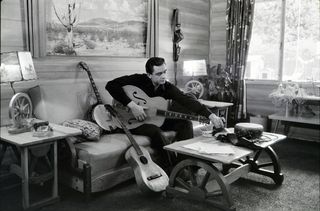Ken Burns Walks the Line With New Film
Ken Burns’s documentary Country Music begins on PBS Sept. 15. The film has eight parts and runs for 16 hours, as the documentarian takes a deep, deep dive into country’s place in music, and in American culture and history.

Burns spoke with Multichannel News about the “four-letter words” that define every country tune. Here’s an edited transcript of the conversation.
MCN: Why country music?
Ken Burns: We’re always looking for stories in American history that are firing on all cylinders. Who would’ve thought that this music that conventional wisdom suggests is white and conservative is, in fact, all about race and class and strong women? This was a wonderful revelation for all of us.
We quote songwriter Harlan Howard in our introduction, saying that country music is three chords and the truth. That is basically admitting that it lacks the sophistication and the complication of classical and some forms of jazz. But the part about the truth, it is dealing with the universal human experiences that we all share. That would be two four-letter words most of us would rather ignore. So we superficialize country music, say it’s just about pickup trucks, good old boys, six-packs and hound dogs. Those four-letter words, love and loss, are at the heart of almost every country song.
MCN: How much of a fan of country were you before taking this on?
KB: I’m a child of R&B and rock ‘n’ roll. I worked at a record store when I was a teenager in Ann Arbor. Of course, Johnny Cash crossed over and you understood that the roots of a lot of stuff the Beatles and the Rolling Stones liked was country. You knew that Bob Dylan went to Nashville and did a series of records there. But it wasn’t the music I knew, and that’s better.
I’ve never made a film where I’ve known about the subject. A couple films, Baseball and Vietnam, I thought I knew, and then every single moment of the production was a humiliation of what I didn’t know.

MCN: For those who say, I’m not into country, this isn’t for me
—
KB: That’s who I made the film for! I knew I had the country fans.
Multichannel Newsletter
The smarter way to stay on top of the multichannel video marketplace. Sign up below.
We bring lots of folks into our editing room. We invite what we call “warm bodies,” including people who can’t know anything about filmmaking and aren’t necessarily country fans.
There were the country music people, including executives from the Country Music Association, who came to a screening in cold Walpole, New Hampshire, in February. And they just shook their heads and said, “We learned more about Nashville and our profession than we ever knew before.”
We had a middle group, which was, “I don’t really know a lot about country music.” At the end of the screenings, [they said], “I didn’t know how much I did know — how many songs are part of my hard drive, my emotional hard drive, songs somebody sang to me, I fell in love over that song.”
One guy said, “Ken, I’ve loved everything you’ve done, but country music, big question mark.” After four days of screenings, he was a puddle, just completely undone, sobbing out of control. He spent the last year and a half apologizing. I said, you don’t need to apologize. I’m a storyteller. I want to introduce you to something new.
When people ask who I made it for, I made it for everybody.
MCN: Who’s a country figure who emerged in your research as vital to the scene?
KB: I just didn’t appreciate Loretta Lynn as much as I should’ve. To me she was just Coal Miner’s Daughter. You see her coming out with “Don’t Come Home a Drinkin’ (With Loving on Your Mind)” the year that the National Organization for Women is founded and women’s liberation goes into the lexicon. She’s not joining any political party, she’s not joining any movement. But she was speaking for these women.
Nobody — not Grace Slick, not Joan Baez — was singing about those things in rock and folk.
MCN: I have to ask — does “Old Town Road” make it into the film?
KB: No, no. We were done well before that. But the whole film is that. It’s the best-selling single of all time, by a black, gay rapper [Lil Nas X]. It speaks to everything in every episode of our film, which is that the presumption that only white people listen to country music and black people only listen to black music is insane.
These are hybrids, mixtures, alloys that are stronger than their constituent parts.
Michael Malone, senior content producer at B+C/Multichannel News, covers network programming, including entertainment, news and sports on broadcast, cable and streaming; and local broadcast television. He hosts the podcasts Busted Pilot, about what’s new in television, and Series Business, a chat with the creator of a new program, and writes the column “The Watchman.” He joined B+C in 2005. His journalism has also appeared in The New York Times, The Philadelphia Inquirer, Playboy and New York magazine.

